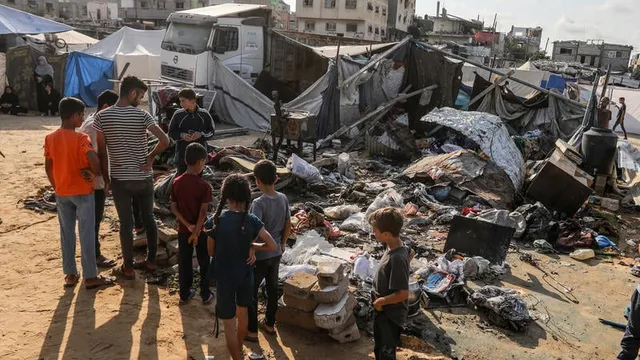
Qatar arms Hamas with billions, enabling violence against Israel
2025-07-03 15:30- Following the October 7, 2023 attack by Hamas on Israel, significant discussion arose about the role of Qatar in the Gaza Strip.
- Qatar has been accused of providing substantial financial support to Hamas, allegedly under the guise of humanitarian aid.
- Concerns are mounting that Qatar's involvement perpetuates violence against Israel and complicates peace efforts in the region.
Express your sentiment!
Insights
Qatar has engaged in a controversial role concerning the Gaza Strip, particularly following the violent outbreak that began on October 7, 2023. This incident witnessed a large-scale attack on Israel by Hamas, resulting in significant casualties among Israelis and foreign nationals. In the aftermath, Qatar expressed strong support for Hamas and framed its financial assistance as humanitarian aid. However, reports suggest that much of this funding has been funneled directly into Hamas's military operations, prompting concerns that Qatar perpetuates a cycle of violence against Israel. Furthermore, various reports have indicated that Qatar's involvement extends beyond financial support; it has also been accused of embedding its political interests in the Palestinian territories through substantial investments in various sectors, including education and media. This strategy allows the Qatari regime to promote narratives favorable to Hamas while undercutting the position of Israel. Observers have criticized these actions, noting that they exacerbate tensions in an already volatile region and undermine potential peace efforts. Moreover, Qatar’s media, particularly Al-Jazeera, has been a platform for promoting pro-Hamas sentiments. Key figures in Qatar’s government have made incendiary statements against Israeli actions, further heightening the rhetoric that supports violence rather than facilitating dialogue. As the conflict continues to evolve, the implications of Qatar's involvement and support for Hamas remain a focal point in discussions about stability in the Middle East. International responses have called for enhanced transparency concerning Qatar's financial dealings, particularly in academia and media, where contributions are purported to skew narratives. There are ongoing concerns that these actions endanger not only regional peace but also influence educational institutions in the United States and other countries, leading to a greater understanding of funding sources and their impacts. As the landscape in Gaza shifts, the roles of various nations, particularly Qatar, will be critical in determining the future of conflict and peace in the region.
Contexts
The implications of an Arab consortium controlling Gaza are multifaceted and critical in understanding the future dynamics of the region. As Gaza has experienced a myriad of conflicts and governance challenges, the emergence of a consortium composed of Arab nations could potentially shift the political landscape and lead to a more stable environment. Such a consortium would likely involve significant investments in infrastructure, education, and healthcare, aimed at improving the quality of life for the residents of Gaza. Economic development initiatives could arise from this collaboration, fostering trade relationships and reducing dependency on foreign aid. These developments could, in turn, attract international support for the region, as stable governance often aligns with the interests of various global stakeholders. The political ramifications of an Arab consortium assuming control in Gaza are equally significant. This coalition may facilitate an easing of tensions with neighboring states, as it presents a united Arab front in addressing the Palestinian cause. A more coordinated approach to governance in Gaza could potentially lead to renewed dialogue with Israel, especially if shared economic interests emerge. The presence of a consortium may also shift internal power dynamics, as local factions adapt to a collective leadership framework. If successful, such an alliance could establish a precedent for cooperation among Arab nations in addressing similar issues in other regions, reinforcing the viability of collaborative governance in conflict areas. However, the establishment of an Arab consortium in Gaza is not without its challenges. Internal divisions among Palestinian political factions pose a significant risk to the success of any new governance framework. Disparate interests and historical rivalries may hinder collaborative efforts and diminish the efficacy of the consortium. Additionally, external influences, such as extremist groups that oppose any form of Arab unity or cooperation with Israel, could destabilize the region further. Thus, a careful diplomatic approach will be required to navigate these complexities and ensure that the consortium can foster genuine peace and prosperity for Gaza's populace. In summary, the implications of an Arab consortium controlling Gaza signify a pivotal moment for both the region and its international relations. While the potential for positive change exists through collaborative governance and economic development, the reality of entrenched internal conflicts and external threats cannot be overlooked. As the situation unfolds, careful monitoring and a commitment to finding common ground among conflicting interests will be vital in determining the trajectory of Gaza under consortium governance.